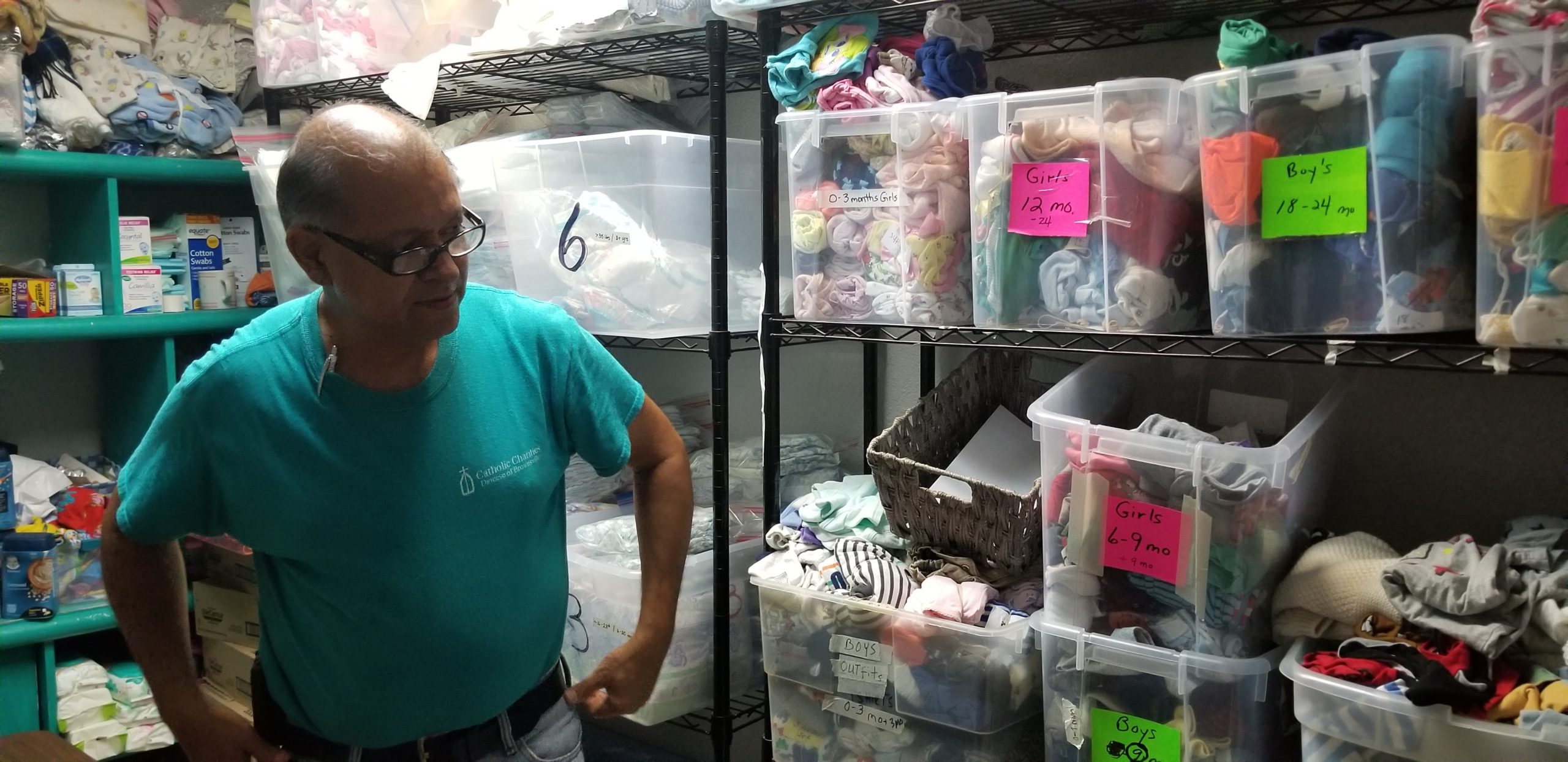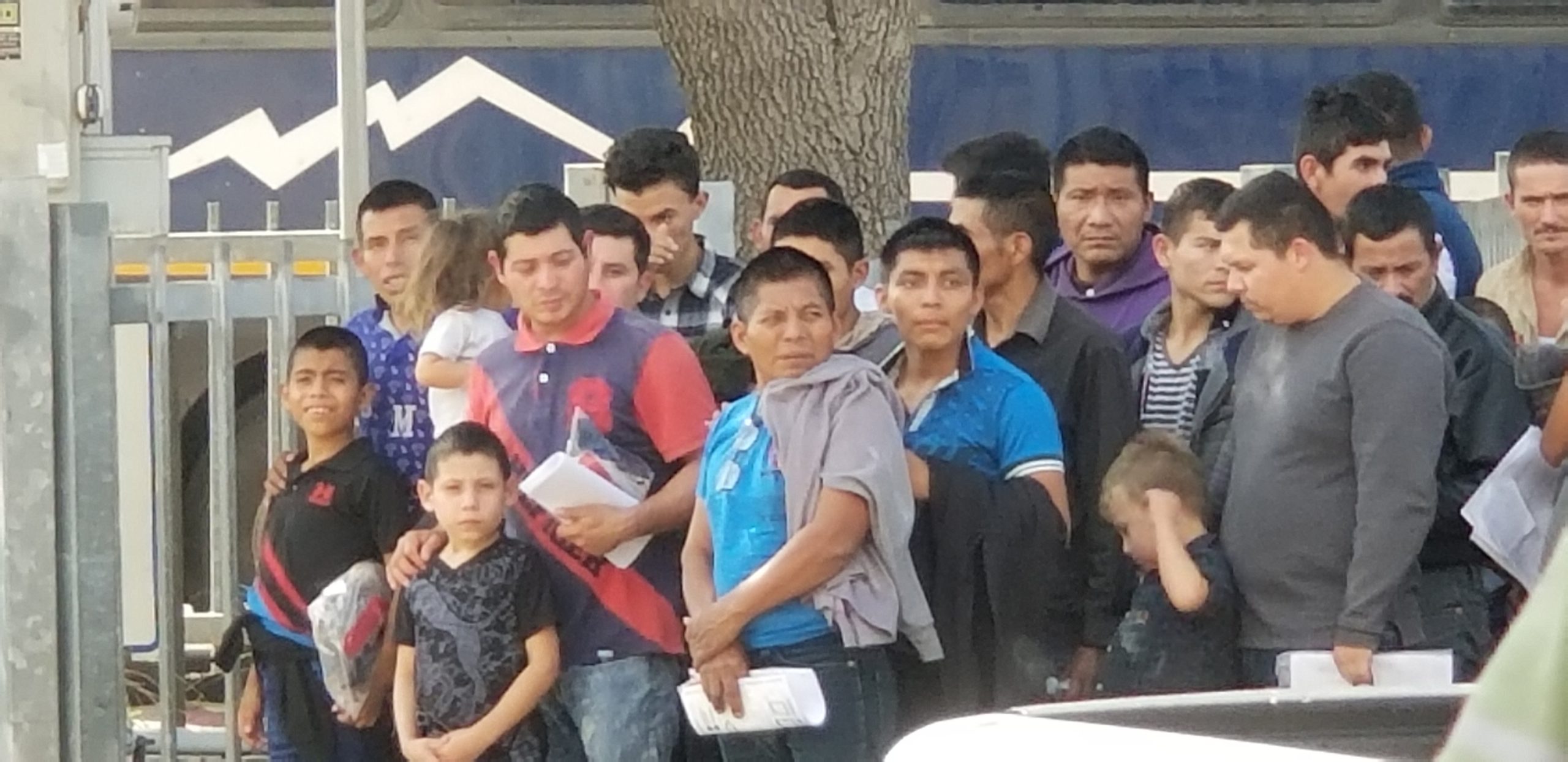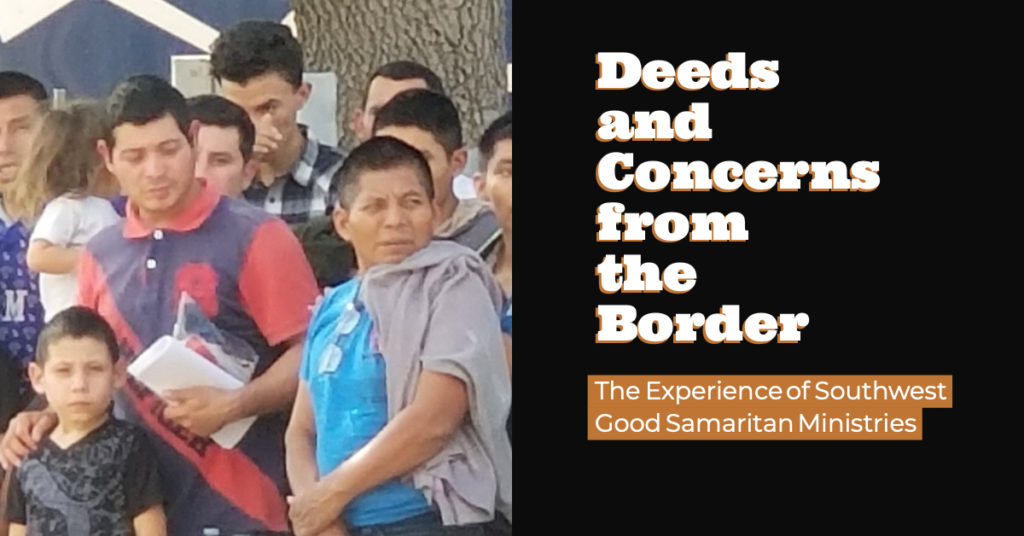Deeds and Concerns from the Border: the experience of Southwest Good Samaritan Ministries
Sharmin DeMoss
Feliberto Pereira
Southwest Good Samaritan Ministries
The Witness and the Deeds
This last week Sharmin spent the morning going to Casa Bugambilia refuge with Larry Cox to see the improvements made with the grant money and the situation with the refugees there. Much was learned about how the system is working. Much of that cannot be put here but has been reported to lawyers for cases of support for improving the flow and clarifying the system for crossing the border to legally request asylum.
 As to the improvements: the permanent improvements include two new restrooms with new doors for four restrooms and showers, repair of two water tanks and one new tank (one is not efficient to repair), the purchase and installation of a new stove top with eight burners to cook for the larger number of people, and repairs to the van which carries the donated rice and beans from Southwest Good Samaritan Ministries. The high number of refugees at the refuge was 104 for one week, then dropped to 50, then to 27 this last week. They believe it will stabilize around 20 if the situation doesn’t change again.
As to the improvements: the permanent improvements include two new restrooms with new doors for four restrooms and showers, repair of two water tanks and one new tank (one is not efficient to repair), the purchase and installation of a new stove top with eight burners to cook for the larger number of people, and repairs to the van which carries the donated rice and beans from Southwest Good Samaritan Ministries. The high number of refugees at the refuge was 104 for one week, then dropped to 50, then to 27 this last week. They believe it will stabilize around 20 if the situation doesn’t change again.
We are quite concerned because the situation has developed that they are being required to be at the base or on the bridge at night to remain on the list. There is little coordination between the city, department, state, cartel, and federal agencies to make the situation safe for the refugees. It is especially difficult for children.
Doctors without Borders was at the refuge, but refugees stay for just a few days (except for the ones who are there for a few months), which makes it difficult/impossible to work effectively with the children who have been raped and/or traumatized. The psychologists can only count on the day that they see them and hope to give them helpful treatment in that time.
Feliberto and Sharmin also visited the McAllen bus station and then the new facility for Catholic Charities/CARITAS which has moved to a facility about a five-minute van ride away with three times the space. They went from 150 people (reunited families – men, women, and children) each day to a high of 600 people. They have been at a fairly consistent 280 to 350 per day, five days a week (Tuesday to Saturday), for the last month.
During our time there, we spoke with three families. All were from Honduras. All had suffered gang violence and threats of death. While Sharmin played games with the girls and chatted with the women, Feliberto got the family history and reasons for leaving from the two fathers (the other father had been killed, as one mother explained). They corroborated each other’s stories of police and gang collusion that is widespread across Honduras. The horrors of the situation, day after day, brought the father to tears again as he recounted the stories. One of the girls I was playing with had been the focus of a particular person within the gang-police and told her father that they planned to kidnap her and keep her for another year until she was ready to “be with” them as a mate or prostitute. She was 12 years old. The family simply picked up what they could carry, their small savings of under $100 US, and their only child, and started walking to safety that they had heard about in the U.S.
That same night, Sharmin was on the bridges with her husband serving dinner to people waiting to request legal asylum. Over the last two weeks, the numbers have grown from a total of 35 at the two bridges between Brownsville and Matamoros, to over 80. Many of these were people who had been living in the safety of Casa Bugambilia, but were told that their names would not be put on a list to cross unless they were present at the bridge each night. It is a more complicated situation, but that is the simple explanation.
These are brave people who are running for their lives and protecting the lives of their children by risking everything.
On a larger border perspective, we have many concerns:
While we are not seeing the surges in numbers from a ‘caravan’ group, we have seen some breakaway individuals, families, and small groups who felt they could not make the westward journey. We are concerned about the use of projectiles, especially tear gas, by the U.S. military and the low altitude helicopters with missiles just inside the U.S. border. The latter has also been observed by our collaborators in both McAllen and Harlingen.
Caritas, our collaborator in McAllen, is continuing to see a steady stream of families released but cannot be sure how long this will last with the changing policies. The changing policies and rhetoric and the lack of clear communication about legal processes for requesting asylum are causing tremendous and unnecessary anguish in the shelters and on the bridges as people await the opportunity to request asylum. There are also many cases reported of Mexican officials requiring money to put, keep, or jump people up the list on the Mexican side when there are openings to request asylum.
The hateful, fear-inducing, and de-humanizing language about asylum seekers is working its way into so many conversations in so many churches and workplaces that it is hard to find ways to reduce the emotional, fear-based way in which decisions are being made. Trying to reduce the fear and increase understanding with factual knowledge as well as the first-hand experiences is now often dismissed. We are working diligently to try to use our longtime influences.
What we are experiencing:

We are concerned about the general policies that led to no crossings and the razor wire in the Rio Grande along Brownsville, Texas to McAllen, Texas. We are not sure how prevalent this is further up the river, but it is in contradiction to the long policies of having one year to request asylum.
We are concerned about the general policy of slowing the stream of people asking for asylum. The two bridges from Matamoros to Brownsville, Texas have slowed to less than a trickle. The asylum seekers at the bridge advised us of several things on the night of 11/27/18. (1) At the International (New) Bridge, no one was allowed to request asylum either on 11/26 or 11/27 – a Monday and Tuesday. They typically do not process people on Saturdays and Sundays now. (2) At the B & M (Old) Bridge, only three people we allowed to request asylum so far this week. (3) The numbers before July were 12-18 per day. Last week it was 3-7 per day at each bridge for 5 days a week. (4) We have seen the new policies tweeted by the president and they seem to be having an effect, legal or not.
We are concerned about the gay and trans people seeking asylum. They are particularly at risk in their travels, both in the cities along the border and (we have heard) in the general population detention centers. We are trying to bring some comfort to those waiting at the two Matamoros bridges and, as best we can tell, they are appropriately integrated into the groups waiting at the bridges.
We are concerned about the children, and especially the mentally and/or physically handicapped children. There are many humanitarian needs and needs for immediate medical attention. We are doing our best with and through our collaborating organizations to ensure that they receive care. Larry and Dra. Nancy Cox at Casa Bugambilia are visiting the bridge now at least weekly and have many concerns about how hygiene standards are causing medical problems including wound infections, coughs that could lead to pneumonia, bed bugs, lice, and fleas transmitted by shared blankets and close quarters.
We are concerned about injuries, STIs, and pregnancies from rapes or from selling their bodies for food along the migration. The symptoms of PTSD cannot be determined as they are not six months post-trauma. They are in current trauma situations.
We and our collaborators are not aware of any violence among the asylum seekers at the Matamoros Bridges, but the city of Matamoros is cartel-run. Our collaborators have been warned to keep asylum seekers off the streets, either in the refuge or at the bridges. We and our collaborators try to stay in small groups and bring the asylum seekers everything they will need. Understandably, they are stir crazy and feeling a sincere lack of freedom and safety in Matamoros. Reynosa, across from McAllen, is run by a different and more dangerous cartel. We have seen people coming from Reynosa who barely survived. We are sure many aren’t surviving.
We are concerned with our collaborators in McAllen, Caritas/Catholic Charities and Angry Tias y Abuelas, that the numbers of detainees being released went from under 150 (men, women, and children) to over 600 per day, or 3,000 per week. The donations strain in clothing items, food, shelter, mental health care, legal assistance and paperwork, bus tickets, etc. has continued and increased over the last months since the family reunifications. Donations are having trouble keeping up with this level for this length of time.
We are especially concerned about the lack of adequate and timely communications between the government agencies and the non-profit organizations that are trying to respond to the humanitarian and Christian need of the people. Our collaborators have frequent changes in logistics and needs, it would seem. People are dropped off at bus stations with nothing except a dirty t-shirt they have worn for weeks, pants without belts, and shoes without shoestrings to fend for themselves. Most of the time it is someone from the bus station who calls our collaborators (Good Neighbor in Brownsville or La Posada in Harlingen) and someone rushes over to help what may be 1 or 30 people. Because of the government contract, Caritas has one to three hours notice most times.
We are concerned about some of the changes we are seeing in Mexican policy and rhetoric:
(1) In the last month, our collaborators have seen visas issued for 120 days of travel to many of those staying at the refuge in Matamoros are now being issued for 10+ times more money and for only 20 days of travel through Mexico.
(2) Some of the asylum seekers in Matamoros bribed the Mexican guards and were let through. We don’t know who on the Mexican or US side might have received part of this money, but we have confirmed that this took place with friends of the people who paid the bribes and with at least one Mexican guard who said, “many others were in on it.” After he was fired, he said this in confidence.
(3) The ‘keep them in Mexico’ concept is not safe or reliable as there is great animosity from the poorer people in Mexico that the government isn’t doing enough for them, and that’s true. But they are blaming the migrants for being a strain on the cities along the border. The rhetoric that they can work at the maquilas is not founded in any research, facts, or reason. There are not nearly enough jobs in Mexico for most Mexican nationals and the cities that have maquilas are the most dangerous along the Texas border at this time.
(4) Expecting a Russian or an Ethiopian (or one of the other 9 non-Spanish nationalities) to assimilate into a country where they have no family is unrealistic and inhumane. The largest percentage of asylum seekers we are seeing at Casa Bugambilia and at the Matamoros bridges are from Cuba. While they speak Spanish, it is a very different language and culture that makes them very recognizable and targets in the Matamoros community. We have heard from non-Spanish speaking individuals and Cubans that they are treated especially harshly in detention.
Global Ministries welcomes gifts in support of Southwest Good Samaritan Ministries (SGSM) – please put SGSM in the Project/Partner box if giving online or in the memo line if giving by check. Gifts also are welcome to One Great Hour of Sharing (UCC) for humanitarian responses within the United States in the asylum-seeking crisis, and to Week of Compassion (Disciples) with the designation Refugees.

